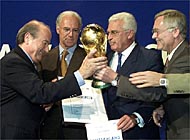The week in Switzerland

The past week in Switzerland was marked by two events with international repercussions: the trial of an Israeli secret agent and the trials and triumphs of international football.
At the end of a five-day trial, the Israeli agent was given a 12-month suspended sentence for trying to bug the telephone of a Swiss-Lebanese man whom Israel suspected of terrorist activities.
The agent, whose identity remained secret during the trial, was found guilty of political espionage, acting illegally for a foreign country, and entering the country under a false name. He was also barred from Switzerland for five years.
He was caught, along with four others, during a failed attempt to install a wiretap in the Swiss-Lebanese man’s home in Berne in 1998. He was freed on bail, but no charges were ever brought against the other agents.
In Zurich, the headquarters of international football’s organising body, Fifa, was the scene of high drama in mid-week. After years of lobbying, hard work and massive financial investment, Fifa was faced with the choice between four teams seeking to host the 2006 World Cup.
After last minute lobbying by leading politicians and sporting officials, the Swiss president of Fifa, Sepp Blatter – clearly relishing the drama and spotlight – opened the winner’s envelope. And to considerable astonishment in some corners, Germany pipped favourites South Africa for the right to stage the prestigious and highly lucrative championships.
Germany won by one vote. The hunt was then launched for a New Zealand official, known to have favoured South Africa, who abstained from the final vote enabling Germany to squeeze to victory.
In domestic affairs, the government unveiled proposals to limit the number of foreigners living and working in Switzerland. The new law would be aimed solely at people from non-European Union countries unless their skills are urgently needed
The government said abuse of the current law by a small minority of foreigners made changes necessary. However, it said that restrictions on foreigners already resident in Switzerland should be eased by removing obstacles to changing professions or cantons.
The draft law is the government’s answer to an initiative, due to be voted on in a September referendum, which aims to limit the number of foreigners in Switzerland to no more than 18 per cent of the population.
The Arts Council, known as Pro Helvetia, was much in the news towards the end of the week, as a long-running struggle between pragmatic and radical reformers came to a head. In the end, its Board of Trustees shied away from radical reforms, and opted for gradual changes.
The agreed reforms include a restructuring of the board, which must be completed by the end of 2001 and the appointment of an assistant director. Other changes will be overseen by an outside body.
These measures were insufficient for two of the more radical board members who promptly resigned.
Finally, it was busy week for a top Swiss businessman. Paul Reutlinger, 57, currently head of the Belgian carrier, Sabena, found himself with two new jobs.
He has been named as the head of Presence Switzerland, the body charged with improving Switzerland’s image internationally. And on Tuesday, he was chosen to lead the merger of the loss-making French domestic airlines AOM, Air Littoral and Air Liberté, which have been bought by the SAir group.
by Ron Popper

In compliance with the JTI standards
More: SWI swissinfo.ch certified by the Journalism Trust Initiative








You can find an overview of ongoing debates with our journalists here . Please join us!
If you want to start a conversation about a topic raised in this article or want to report factual errors, email us at english@swissinfo.ch.